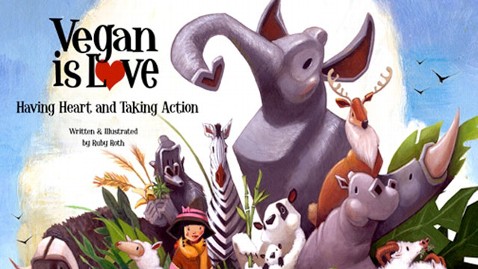Children's Book Encourages Vegan Lifestyle

The cover of Ruby Roth's children's book, " Vegan is Love," is adorned with whimsical animals, but the book takes on controversial issues surrounding veganism, food manufacturing and distribution, along with how our dietary decisions affect our world. Roth said the book is meant to introduce kids to a lifestyle of "compassion and action."
"It's clear we can't rely on our leaders, CEOs, or major companies to fix anything - the environment, our food, the economy, or our health," Roth told ABCNews.com. "Instead of worrying or 'occupying,' I decided to write a book for a new generation who will need to think, eat, and treat the environment differently if we are to solve the most looming health and environmental issues. With vegan choices, we can affect every major industry and reach every corner of the world."
Roth. 29, is a mother of two and raises her children on a vegan diet. Roth became a vegan in 2003, when her husband challenged her to a "health experiment." She said her health and energy "thrived so quickly" that she never went back to a non-vegan lifestyle.
Studies continue to link animal products with chronic disease, including diabetes, obesity and asthma, but these issues "are practically non-existent in the worldwide vegan population," she said.
Still, some experts said the book oversimplifies a controversial subject, and while a vegan diet can be nutritious if properly planned, parents may have trouble getting children to eat the proper amounts of all the necessary food groups when kids can be finicky with food already.
Scaring people into changing a behavior rarely yields long-term behavior change, said Connie Diekman, director of university nutrition at Washington University in St. Louis. But "educating children about the many wonderful food options they have in the plant world would be a positive way to help them enjoy food, feel good about their food choices and develop an eating plan they really will maintain," she said.
Nevertheless, Keith Ayoob, associate professor of pediatrics at Albert Einstein College of Medicine in the Bronx, said children should be exposed to plants and animal foods at an early age so they can understand the healthy variety that is available to them.
"Any time you limit the variety of healthy foods, you chance limiting the nutrients they get, " said Ayoob. "Over time, that can catch up with them."
Dr. David Katz, director of the Yale Prevention Center, said a vegan diet is "fine" for kids: "As long as any nutrient shortfalls are addressed, a vegan diet is certainly apt to be better for most kids than than the typical American diet they have now."
A vegan diet not only excludes meat, fish and poultry, but does not use other animal products and byproducts, including eggs, dairy, honey, leather, silk and wool. The nutritional elements are centered around fruits, vegetables, legumes, whole grains, seeds and nuts.
A book may be just the thing to encourage healthy habits, Katz said.
"Adults are too willing to turn a blind eye to the way our animal-based diets are achieved," said Katz. "The torture and maltreatment of animals are real, whether or not we acknowledge them. Adults can make the conscious choice not to look there, to help protect a lifetime of dietary preferences. Kids are more malleable and impressionable. Maybe childhood is the best time to create awareness and change behavior accordingly."
Which is worse, Katz asked? "Telling kids about what's going on? Or raising them in a world where it is going on and keeping them in the dark about it so they become complicit to it?"
Roth not only encourages parents and kids to do research on veganism, she said veganism is one of the most "patriotic, American things we can do."
"We don't have to fear anything we have the power to change," said Roth. "This book is about the personal agency of people, big and small, in creating an active, more conscious, sustainable world. We have freedom in this country to play an active role in our communities and cities… Going vegan is an embodiment of the philosophies our country was founded on: independence, rugged individualism and self-reliance."